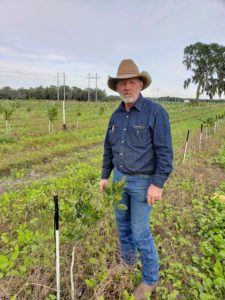A five-acre farm-to-table citrus grove proves old-school techniques paired with new innovation successful.
Brad Turner’s earliest memories are of working beside his father in his citrus grove with a bucket of fertilizer hooked over his arm to spread onto the soil “the old way.” But to Turner, who spent a lifetime in Florida citrus production, what’s old is new.
To get to this place of combining the old school of thought with innovative new protocols, Turner had suffered every citrus growers’ nightmare—he lost his groves to citrus greening. But after exhaustive research and a chance meeting with John Flynn, Southeast & Caribbean Territory Manager for Performance Nutrition, things began to change.
When greening decimated his last 50 acres, Turner told his sons “they were done with being in the citrus business.” However, his life’s work as a citrus grower and his desire to crack the code of why there were stands of healthy, wild citrus trees adjacent to diseased groves, was too compelling a puzzle to leave alone. Turner had studied soil fertility, biology and chemistry before meeting a citrus grower who’d had some success using soil amendments: manure, compost, and cover crops. Turner began to explore the relationship between soil health and tree health.
Turner was convinced that the key to healthy trees is healthy soil through nutrition, microbes, and fertility. Looking at a stand of wild citrus trees drop fruit back into their native soil, Turner realized “the natural, microbial, composting process, with the surrounding diversity of plant life and cycling of minerals, was left to the natural process.”
It was like a lightning bolt. Even the act of harvesting, and removing fruit from the tree instead of letting fruit fall and decay back into the soil takes dozens of micronutrients from the soil that need to be replenished. It was, to him, common sense. If you harvest fruit from a tree, you’re removing the nutrients used to grow that fruit from the ecosystem. To complete the cycle, nutrients have to be replaced back into the soil, which is exactly the theory behind the PERFORMANCE® Young Citrus Tree Program™.
His passion for citrus is alive once again. Together with his son, Lane, he bought a five-acre piece of land in Lithia, FL, and Turner Citrus was re-born. As Turner Citrus was getting off the ground, Brad Turner and Performance Nutrition’s Flynn had a fruitful meeting at a Lunch & Learn event in Plant City, FL. Performance Nutrition is an industry leader in specialty, innovative products, many of which are enriched with beneficial organic components and microorganisms that promote soil and tree health.
Together, Flynn and Turner agreed to implement Performance Nutrition’s PERFORMANCE® Young Citrus Program™ as a trial on Turner Citrus’ new grove. “For Performance Nutrition, this is a great trial. We will go all the way from planting to the first harvest using a program tailored specifically for them with balanced nutrition, soil health, and yield as the priorities,” said Flynn.
“I couldn’t be doing what I’m doing without the products from Performance Nutrition,” said Turner. “Performance Nutrition understands the biology side of it. Looking at the whole soil aspect of it – soil and tree fertility, dual-chelated minerals, and diverse populations of microbes. The living part of the soil is feeding the tree so the plant is healthy and bears fruit. Healthy soil makes healthy trees.”
The PERFORMANCE® Young Citrus Tree Program™ is a regimen of products for foliar applications to nourish the trees and soil-applied products to enrich the soil that helps young trees to thrive. Among the products included in the regimen are NutriSmart-B, a soil inoculant in a granular humate carrier to establish micro-organisms that deliver N from the atmosphere, and, P, K and Si from the soil along with KaPre® ExAlt, which unlocks soil-bound nutrients and micronutrients. Both products also act to improve the soil’s characteristics, content and vitality leading to nutrient use efficiency.
Turner Citrus features 30+ varieties, heirloom and new, of citrus including Pink Lemons, Dancy and Tango Tangerines. Within the next few years, the farm will serve the local community with a farm-to-table stand and packing house.
Turner said he realizes that farmers utilizing the standard method of mostly foliar applications for citrus production may think the soil health focus is a bit too progressive. But, Turner said, it’s quite the opposite. He’s drawing on age-old methods of feeding the whole tree through the health of the soil, not just the leaf of the tree, to grow a stronger grove.
Old school, indeed.

